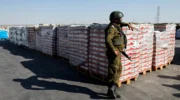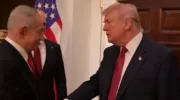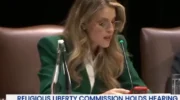CNN has fired commentator Marc Lamont Hill for a speech (view above) that he gave at the International Day of Solidarity with the Palestinian People Special Meeting at the United Nations on Wednesday. (See transcript below)
Pro-Israel groups and individuals such as the Anti-Defamation League (ADL), National Council of Young Israel, Simon Wiesenthal Center, and Washington Examiner Executive Editor Seth Mandel immediately criticized Hill, and CNN quickly fired him.
Hill is a professor at Temple University, author, and media host. Ebony Magazine named him one of America’s 100 most influential Black leaders.
In response to the controversy, Hill tweeted:
‘Yesterday, I gave a speech at the UN in which I critiqued Israel’s polices and practices toward Palestinians. It’s baffling how people are not responding to the critique, but instead responding to things I didn’t actually say.
‘In my speech, I talked about the need to return to the pre-1967 borders, to give full rights to Palestinian citizens of Israel, and to allow right of return. No part of this is a call to destroy Israel. It’s absurd on its face.
‘I believe in full rights for all citizens. I believe in safety for all citizens. I believe in self-determination for all citizens. This is not an anti-Semitic position.
‘While I have my own beliefs about one vs two state solutions (I prefer one), it is not my job as an outsider to decide for Palestinians or Israelis. Regardless of the resolution, however, Palestinians cannot be denied freedom, self-determination, or human rights.
‘Unfortunately, we are in a moment where any critique of the Israeli government is called anti-Semitic. Any call for Palestinian freedom is seen as an attempt to diminish Israel freedom. This does not have to be, nor should it be, the case.
‘I concluded my remarks with a call to free Palestine from river to sea. This means that all areas of historic Palestine —e.g., West Bank, Gaza, Israel— must be spaces of freedom, safety, and peace for Palestinians.
‘Anyone who studies the region, or the history of Palestinian nationalism, knows that “river to sea” has been, and continues to be, a phrase used by many factions, ideologies, movements, and politicians.
‘The phrase dates back to at least the middle of the British Mandate and has never been the exclusive province of a particular ideological camp. The idea that this is a Hamas phrase is simply untrue.
‘It’s also ABSURD and illogical to suggest that a speech that explicitly called for redrawing borders and granting full citizenship for Palestinians IN Israel was also calling for its destruction. People either didn’t listen to the speech or they’re being dishonest.’
After some Twitter exchanges, Hill responded with more tweets:
‘I normally would ignore the current drama, but it’s actually important to me that I’m clear and understood. As a matter of principle.
‘I support Palestinian freedom. I support Palestinian self-determination. I am deeply critical of Israeli policy and practice. I do not support anti-Semitism, killing Jewish people, or any of the other things attributed to my speech. I have spent my life fighting these things.
‘My reference to “river to the sea” was not a call to destroy anything or anyone. It was a call for justice, both in Israel and in the West Bank/Gaza. The speech very clearly and specifically said those things. No amount of debate will change what I actually said or what I meant.
‘This isn’t a case of throwing rocks and hiding hands. I genuinely believe in the arguments and principles that I shared in the speech. I also genuinely want peace, freedom, and security for everyone. These are not competing ideals and values.’
To Take Action:
Many groups are now calling for CNN to reinstate Hill. CNN’s contact info is:
CNN Twitter: https://twitter.com/CNN
CNN: 1 (404) 827-1500
CNN Feedback form: https://www.cnn.com/feedback
Sign a petition here
Unofficial Transcript by Human Rights Voices
November 28, 2018
Statement by Marc Lamont Hill, “Invited Representative of Civil Society”
Special Meeting of the Committee on the Exercise of the Inalienable Rights of the Palestinian People in observance of the “U.N. International Day of Solidarity with the Palestinian People”
U.N. Headquarters
New York, New York
Mr. Secretary-General, Chairman, Ambassadors, and Your Excellencies, good afternoon.
It is with great honor and humility that I accept the opportunity to speak before you. As a scholar, as an activist, and as a citizen, I am profoundly interested in the plight of the Palestinian people as well as the broader ethical, moral, and political implications of their struggle for freedom and justice as well as equality. As such, this annual convening represents a critical intervention. It also represents a site of possibility. On the other hand, it shows considerable irony.
As you well know, this year marks the 70th anniversary of the Universal Declaration of Human Rights. This declaration is produced out of the rubble and contradictions of World War II. And it was intended to offer a clear ethical and moral outline of the basic rights and freedoms to which all human beings, irrespective of race, religion, class, gender or geography are entitled. This declaration, of course, has been far from perfect, both in design and in execution. Too often we have framed human rights through the lens of the West. We viewed it through the gaze of colonialism, and we have assessed them through the limited prism of our experiences. Simply put, the powerful have too often attempted to universalize their own particular and local values.
Still the Universal Declaration of Human Rights has offered us a flawed but functional starting point from which to articulate basic moral and ethical ambitions as global citizens. These ambitions have been particularly helpful when attempting to keep track of the vulnerable against the backdrop of imperialism, exploitative economic arrangements, white supremacy, patriarchy, and all the other entanglements of the modern nation state.
For this reason it is indeed ironic and sad that this year also makes the 70th anniversary of the Nakba, the great catastrophe in May 1948 that resulted in the expulsion, murder, and to date, permanent dislocation of more than a million Palestinians. For every minute that the global has articulated a clear and lucid framework for human rights, the Palestinian people have been deprived of the most fundamental of them.
While the Universal Declaration for Human Rights says that all people are “born free and equal in dignity and rights,” the Israeli nation state continues to restrict freedom and undermine equality for Palestinian citizens of Israel as well as those in the West Bank and Gaza. At the current moment, there are more than 60 Israeli laws that deny Palestinians access to full citizenship rights, simply because they’re not Jewish. From housing to education to family reunification, it is clear that any freedoms naturally endowed to all human beings are actively being stripped away from Palestinians through Israeli state craft.
While human rights promises the right to life, liberty, and security of person, Palestinians continue to live under the threat of random violence by Israeli military and police, disproportionate violence within the West Bank and Gaza, unprompted violence in the face of peaceful protest, and misdirected violence by an Israeli state that systematically fails to distinguish between civilians and combatants.
While the Universal Declaration for Human Rights protects us again torture and cruel and inhuman or degrading treatment or punishment, Palestinians continue to be physically and psychologically tortured by the Israeli criminal justice system, a term I can only use with irony.
As human rights groups around the world have noted, the use of solitary confinement constitutes a clear and indisputable form of torture. Yet in the West Bank Palestinians are routinely subjected to solitary confinement and indefinite detention, often without any formal charges being file. Last year, the Israeli Supreme Court ruled that physical torture in “exceptional cases,” including ticking time-bomb situations, constitute acceptable means by which to engage in torture. Although these exceptions are themselves a violation of the absolute human right not to be tortured, Israeli security operates in practice in such a way that nearing all Palestinian cases are viewed as exceptional. Nearly every Palestinian is understood to be a potential terrorist, thereby making them susceptible to “ticking time-bomb” investigation tactics at all times. As such, Israel’s practices are routinely in clear violation of the UN’s Convention on Torture, which was signed by Israel in 1986 and ratified in 1991.
While the Universal Declaration for Human Rights insists that no one be subjected to arbitrary arrest, detention, or exile, Palestinians are routinely denied due process of law. West Bank Palestinians are regularly placed under administration detention, a framework that allows them to be incarcerated for up to six months, and can be extended after a judicial review, without being charged with a crime. The only thing needed for such outcomes is the ambiguous claim of a security threat, a claim used by the Israeli state at all times, at all costs, and for all reasons. Through this vagueness, Palestinians are routinely punished for their political views rather than any actual threat of violence.
The Universal Declaration for Human Rights insists that all humans are entitled to a “fair and public hearing by an impartial tribunal.” Israeli military courts, the exclusive adjudicator largely for West Bank residents, and in some cases Palestinian citizens of Israel, they have a conviction rate of more than 99 percent. That suggests that Palestinians are either more guilty than any other group in human history or that the Israeli government is unwilling or incapable of offering fair and impartial trials for Palestinians.
The Universal Declaration for Human Rights promises the right to freedom of movement and residence within the borders of each state as well as the right to leave any country, including his “own” and to return to said country. It is impossible to travel throughout historic Palestine and not see the blatant restriction of movement between cities in the occupied Palestinian territories as well as inside the State of Israel. Standing checkpoints, temporary or flying checkpoints, annexation walls, and other security barriers prevent Palestinians from moving freely, both within areas legally designated by the Israeli government and cosigned by the Palestinian Authority under the terms of Oslo, but also we see in Gaza the restriction of movement that is so severe that it literally defines life in the area.
I promise you that I will not exhaust all of my time by enumerating every human rights violation perpetrated by the Israeli government. These are well known and have been well documented by every credible human rights organization in the world.
Rather, I would like to speak to you about the urgency of the current moment.Forgive my thirst. I literally just off of a flight from Palestine to come to address you this morning and I was boycotting the Israeli water so I was unable to quench my thirst, but thank you for your indulgence. Or for indulging me rather.
As we speak, the conditions on the ground for Palestinian people are worsening. In recent decades, the Israeli government has moved further and further to the right, normalizing settler colonialism and its accompanying logics of denial, destruction, displacement, and death.
Despite international condemnation, settlement expansion has continued. At the same time, home demolitions and state-enforced displacement continues to uproot Palestinian communities. For Gazans, the 11-year Israeli and Egyptian blockade by land, air, and sea has created the largest open-air prison in the world. With only four percent potable water, electricity access that is limited to four hours per day, 50 percent unemployment, and the looming threat of Israeli bombs, Gaza continues to constitute one of the most pressing humanitarians crises of the current moment.
In the West Bank, conditions are not much better. Unemployment is generally around 18 percent with frequent loss of income due to Israeli military closures making it impossible for Palestinian workers to get access to jobs. Settlements and the extra land allocated for them, as well as closed military zones and other restrictions make it impossible for Palestinian towns to grow. And in the midst of it all, Prime Minister Netanyahu’s administration has become increasingly indifferent to critique, censure, or even scorn from the international national community for its practices.
Perhaps the most glaring example of this indifference, as well as the urgency of the current moment, is the recently passed nation-state law. Through this basic law, the Israeli state has officially rejected Arabic as an official state language. It has described settlement expansion, both inside and outside of the Green Line, as a national value, and it has reinforced the fact that Israeli is not a state of all of its citizens.
As an American, I am embarrassed that my tax dollars contribute to this reality. I am frustrated that no American president since the start of the occupation has taken a principled and actionable position in defense of Palestinian rights. And I am saddened, through not surprised, that President Trump’s administration has further emboldened Israeli’s behavior through its recent actions.
In May of this year, President Trump officially moved the US Embassy to Jerusalem, which he recognized as the undivided capital of Israel. This choice not only flew in the face of international law and precedent, but also constituted a powerful provocation and a diplomatic death blow. In late August, President Trump then permanently reneged on America’s commitment to funding UNRWA, a move that now leaves millions of Palestinian refugees in medical, economic, and educational peril.
Moreover, the move serves as a political strong-arm tactic whereby the United States is unilaterally attempting to resolve, through the Trump administration, the final status of Palestinian refugees.
While President Trump’s policies have been the most dramatic, it is important that I stress to you, to reiterate to you that they are wildly out of step with American policy. Cuts to UNRWA is an idea that has been raised in Washington for years, dating back at least to the George W. Bush administration.
President Trump’s decision to move the US Embassy in Israel from Tel Aviv to Jerusalem caused enormous controversy, but he was merely implementing a bipartisan law Congress passed in 1995. And in so doing he executed what has already been official United States policy and the fulfillment of a promise made by every United States president and presidential candidate, Democrat and Republican, for a very long time.
With regard to the question of Palestine, Donald Trump is not an exception to American policy. Rather, Donald Trump is a more transparent and aggressive iteration of it.
As I mentioned at the beginning of my remarks, the words offered today by everyone in this room are a necessary component of our resistance efforts. We need powerful, counterintuitive, dangerous, and courageous words. But we must also offer more than just words. Words will not stop the village of Khan al-Ahmar with its makeshift schools created by local Bedouin villages. Words will not stop them from being demolished in violation of the Fourth Geneva Conventions. Words will not stop poets like Dareen Tatour from being caged in Israeli jails for having the audacity to speak the truth about the conditions of struggle on her own personal Facebook page. Words will not stop peaceful protesters in Gaza from being killed as they fight for freedom against Israel’s still undeclared borders.
Regarding the question of Palestine, beyond words we must ask the question, what does justice require? To truly engage in acts of solidarity, we must make our words flesh. Our solidarity must be more than a noun. Our solidarity must become a verb.
As a Black American, my understanding of action and solidarity action is rooted in our own tradition of struggle. As Black Americans resisted slavery, as well as Jim Crow laws that transformed us from a slave state to an apartheid state, we did so through multiple tactics and strategies. It is this array of tactics that I appeal to as I advocate for concrete action from all of us in this room.
Solidarity from the international community demands that we embrace boycotts, divestment, and sanctions as a critical means by which to hold Israel accountable for its treatment of Palestinian people. This movement, which emerges out of the overwhelming majority of Palestinian civil society offers a nonviolent means by which to demand a return to the pre ’67 borders, full rights for Palestinian citizens, and the right of return as dictated by international law.
Solidarity demands that we no longer allow politicians or political parties to remain silent on the question of Palestine. We can no longer in particular allow the political left to remain radical or even progressive on every issue from the environment to war to the economy. To remain progressive on every issue except for Palestine. Contrary to Western mythology, Black resistance to American apartheid did not come purely through Gandhi and nonviolence. Rather, slave revolts and self-defense and tactics otherwise divergent from Dr. King or Mahatma Gandhi were equally important to preserving safety and attaining freedom. We must allow—if we are to operate in true solidarity with Palestinian people, we must allow the Palestinian people the same range of opportunity and political possibility. If we are standing in solidarity with the Palestinian people, we must recognize the right of an occupied people to defend itself. We must prioritize peace. But we must not romanticize or fetishize it. We must advocate and promote nonviolence at every opportunity, but we cannot endorse a narrow politics of respectability that shames Palestinians for resisting, for refusing to do nothing in the fact of state violence and ethnic cleansing.
At the current moment, there is little reason for optimism. Optimism, of course, is the belief that good will inevitably prevail over evil, that justice will inevitably win out. In the course of human history, and certainly even in the course of the United Nations, there is no evidence of such a proposition. Optimism is unsophisticated. Optimism is immature. Optimism is what my students have when they take examinations that they did not study for. Some become quite religious at that time.
But regardless of their strategies of optimism, the outcome is far from guaranteed or even likely. What I’m challenging us to do in the spirit of solidarity is not to embrace optimism but to embrace radical hope. Radical hope is a belief that despite the odds, despite the considerable measures against justice and peace, despite the legacy of hatred and imperialism and white supremacy and patriarchy and homophobia, despite these systems of power that have normalized settler colonialism, despite these structures, we can still win. We can still prevail.
One motivation for my hope in the liberation and ultimate self-determination of the Palestinian people comes in August of 2014. Black Americans were in Ferguson, Missouri in the Midwest of the United States protesting the death of a young man named Michael Brown, an unarmed African-American male who had been killed by a law enforcement agent. And as we protested, I saw two things that provided hope for the Palestinian struggle. One was that for the first time in my entire life of activism I saw a sea of Palestinian people. I saw a sea or Palestinian flags in the crowd saying that we must form a solidarity project. We must struggle together in order to resist because state violence in the United States and state violence in Brazil and state violence is Syria and state violence in Egypt and state violence in South Africa, and state violence in Palestine are all of the same sort. And we finally understood that we must work together and not turn on each other, but instead turn to each other.
And later that night when the police began to tear gas us, Mariam Barghouti tweeted us from Ramallah. She, along with other Palestinian youth activists, told us that they tear gas that we were experiencing was only temporary. They gave us tips for how to wash our eyes out. They told us how to make gas masks out of t-shirts. They gave us permission to think and dream beyond our local conditions by giving us a transnational or a global solidarity project.
And from those tweets and social media messages, we began then to organize together. We brought a delegation of black activists to Palestine, and we saw the connections between the police in New York City, who are being trained by Israeli soldiers, and the type of policing we were experiencing in New York City. We began to see relationships of resistance, and we began to build and struggle and organize together. That spirit of solidarity, a solidarity that is bound up not just in ideology but in action, is the way out.
So as we stand here on the 70th anniversary of the Universal Declaration of Human Rights and the tragic commemoration of the Nakba, we have an opportunity to not just offer solidarity in words but to commit to political action, grassroots action, local action, and international action that will give us what justice requires. And that is a free Palestine from the river to the sea.
Thank you for your time.




